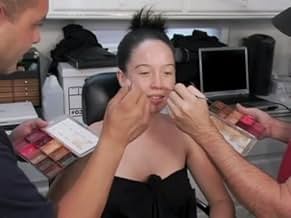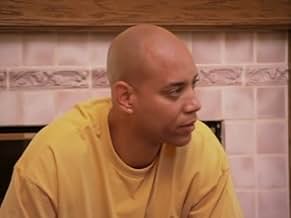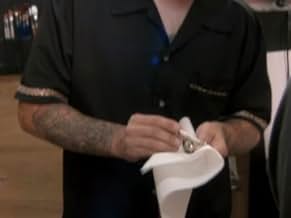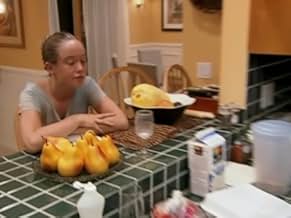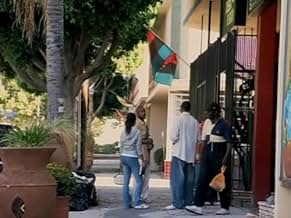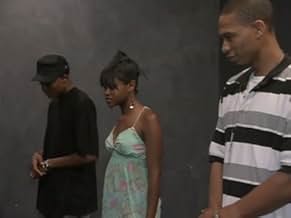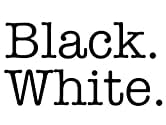A white family and a black family find out what it's like to switch lives.A white family and a black family find out what it's like to switch lives.A white family and a black family find out what it's like to switch lives.
- Won 1 Primetime Emmy
- 1 win & 1 nomination total
Browse episodes
Featured reviews
I began discussions about prejudice with my high school students, before starting to show this series. My classrooms consist of equal representation of Asian, Black, Hispanic, and White races. Many of them were not aware of racism in their personal experience. Each week I've been showing the new episode of "Black, White". Each week they've been asked to write their views and comments on several questions concerning that episode. Then the next day the students are asked to share their comments, which manifests a lot of good discussion and interaction amongst the students.
Most of the students do not receive the FX Channel at home so they really look forward to each week's showing and the ensuing discussion. This lesson plan will definitely become part of my annual repertoire. I hope that this series is released on DVD, for easier setup in the future.
As a comment for further seasons, the producers could develop the racial differences between other cultural combinations (i.e.: Black and Hispanic, Gays and Straights, Jews and Gentiles, Male and Female, etc.)
Most of the students do not receive the FX Channel at home so they really look forward to each week's showing and the ensuing discussion. This lesson plan will definitely become part of my annual repertoire. I hope that this series is released on DVD, for easier setup in the future.
As a comment for further seasons, the producers could develop the racial differences between other cultural combinations (i.e.: Black and Hispanic, Gays and Straights, Jews and Gentiles, Male and Female, etc.)
Network: FX; Genre: Reality, Documentary; Content Rating: TV-MA (strong language); Perspective: Contemporary (star range: 1 - 4);
Seasons Reviewed: Complete Series (1 season)
I love FX. Even when their shows aren't very good, they are still so bold and unique that they thrash about making a formidable fight. "Black. White." is a 1-shot, 6 episode series developed by R. J. Cutler and Ice Cube - lending his celebrity name and a halfway decent theme song to "the project" - about two families who employ an elaborate Hollywood make-up regimen to "trade races", making the white family (Bruno, Carmen and daughter Rose) appear black and the black family (Brian, Renee, and son Nick) appear white. Creepy? Maybe a little, but we've never seen this before, which is always a find in the creatively dead and socially irresponsible reality genre.
It starts out fun enough. It's fascinating watching the family members react to each other's new appearance. The opportunity they are given to walk around looking like someone other than themselves, is a cathartic human curiosity that goes beyond race and ethnicity. Brian gets his white make-over and goes straight to the driving range, then gets treatment from a shoe salesman I've never heard of life-long white men getting. Bruno, on the other hand, relishes what he will do when first called the N-word while in black make-up. But after the first episode, which also includes a test group where the two races hear what others think of them (the show's provocative high point), the fun is pretty much gives way to standard reality series impulses.
From there, you can take "Black. White." one of two ways: as a reality series or as a social experiment. Taken simply as a reality show it is decidedly above the rest, and both families have enough emotional baggage to pass the mustard for simple, interesting TV. End of that review.
But like Actual Reality's other FX series, the entertaining "30 Days", Cutler and Cube want "Black. White." to be more. They want to make us think. They want to break down the wall of self-segregation that these two races erect for themselves. For the duration of the project the families are made to live together so that they will share their experiences, and, hopefully, have intellectual discussions on the state of race relations in America. Because talking is the first step toward fixing the problem - right? But it isn't long before the women are at each others throats just like in any other reality show.
For all of its good intentions, in choosing these particular people as its participants they force us to debate a false reality. Instead of showing the national battle between black and white, "Black" actually ends up showing the battle between blacks and liberals, with Carmen as the prototype for someone who thinks that because her parents where involved with the civil rights movement, that she's got the right idea about race, all the while not realize that every "tolerant", "open-minded" idea she has toward black people is rooted in a weird core belief that they are SO different that they need to be understood like "creatures" as she puts it and coddled in society. Renee notes that Carmen treats her like an alien.
The subjects quickly prove themselves to be too kooky; saying things and making social mistakes that the average person really wouldn't say or do. We constantly feel like we are smarter than they are and as a result, can't learn anything from them. Is it all about skin color? Is racism perceived or indoctrinated? Any message the show was going for in the first place gets muddled, falling back on the old "there are no easy answers" line and refusing to pose any theories. Any hope of getting people to talk about race evaporates the moment Bruno showcases his own (hold on ) rap video.
The guys are pretty cool, but as guinea pigs, both Bruno and Brian are so hell bent on proving their take on racism they, frustratingly, won't even consider another view. Bruno (a pompous ass who views the world through the prism of himself), to prove that people see racism because they are looking for it, and Brian who takes the traditional line that black people are immersed in white culture and are constantly being sized up every where they go (like teenagers) by whites. When racist things don't happen, Brian and Renee assume that it would have happened had they not been in white make-up. For her part, Renee befriends a white women outside the project, deciding that she can be friends with her - not because she has learned anything about "the white experience", but because of the understanding way the women treats her. It is still all about her.
The show completely falls apart as an experiment when it starts to obviously take Brian's side. The last half of the series is less about two different ethnicities learning about each other and becomes a cliché, sanctimonious sermon, the yardstick for success of which is how well it can beat into Bruno, Carmen and us how victimized black America is. "Black" has a view of race no deeper than surface-level stereotypes.
What does work about "Black.White" are the kids. Rose, the overly emotional daughter, is ripped apart having to lie to her new friends in a black poetry group. A bond forms between her, Brian and Renee and the series rightly climaxes at Rose's poetry showcase.
Nick, who in white face looks like Michael Jackson but hilariously won't change the way he speaks, is equally hell bent, but on learning absolutely nothing. The most fascinating storyline in the show involves Nick's disrespect for money, his ignorance over the use of the N-word and the fact that he doesn't see things in terms of race until his parents train him to see it.
* * / 4
Seasons Reviewed: Complete Series (1 season)
I love FX. Even when their shows aren't very good, they are still so bold and unique that they thrash about making a formidable fight. "Black. White." is a 1-shot, 6 episode series developed by R. J. Cutler and Ice Cube - lending his celebrity name and a halfway decent theme song to "the project" - about two families who employ an elaborate Hollywood make-up regimen to "trade races", making the white family (Bruno, Carmen and daughter Rose) appear black and the black family (Brian, Renee, and son Nick) appear white. Creepy? Maybe a little, but we've never seen this before, which is always a find in the creatively dead and socially irresponsible reality genre.
It starts out fun enough. It's fascinating watching the family members react to each other's new appearance. The opportunity they are given to walk around looking like someone other than themselves, is a cathartic human curiosity that goes beyond race and ethnicity. Brian gets his white make-over and goes straight to the driving range, then gets treatment from a shoe salesman I've never heard of life-long white men getting. Bruno, on the other hand, relishes what he will do when first called the N-word while in black make-up. But after the first episode, which also includes a test group where the two races hear what others think of them (the show's provocative high point), the fun is pretty much gives way to standard reality series impulses.
From there, you can take "Black. White." one of two ways: as a reality series or as a social experiment. Taken simply as a reality show it is decidedly above the rest, and both families have enough emotional baggage to pass the mustard for simple, interesting TV. End of that review.
But like Actual Reality's other FX series, the entertaining "30 Days", Cutler and Cube want "Black. White." to be more. They want to make us think. They want to break down the wall of self-segregation that these two races erect for themselves. For the duration of the project the families are made to live together so that they will share their experiences, and, hopefully, have intellectual discussions on the state of race relations in America. Because talking is the first step toward fixing the problem - right? But it isn't long before the women are at each others throats just like in any other reality show.
For all of its good intentions, in choosing these particular people as its participants they force us to debate a false reality. Instead of showing the national battle between black and white, "Black" actually ends up showing the battle between blacks and liberals, with Carmen as the prototype for someone who thinks that because her parents where involved with the civil rights movement, that she's got the right idea about race, all the while not realize that every "tolerant", "open-minded" idea she has toward black people is rooted in a weird core belief that they are SO different that they need to be understood like "creatures" as she puts it and coddled in society. Renee notes that Carmen treats her like an alien.
The subjects quickly prove themselves to be too kooky; saying things and making social mistakes that the average person really wouldn't say or do. We constantly feel like we are smarter than they are and as a result, can't learn anything from them. Is it all about skin color? Is racism perceived or indoctrinated? Any message the show was going for in the first place gets muddled, falling back on the old "there are no easy answers" line and refusing to pose any theories. Any hope of getting people to talk about race evaporates the moment Bruno showcases his own (hold on ) rap video.
The guys are pretty cool, but as guinea pigs, both Bruno and Brian are so hell bent on proving their take on racism they, frustratingly, won't even consider another view. Bruno (a pompous ass who views the world through the prism of himself), to prove that people see racism because they are looking for it, and Brian who takes the traditional line that black people are immersed in white culture and are constantly being sized up every where they go (like teenagers) by whites. When racist things don't happen, Brian and Renee assume that it would have happened had they not been in white make-up. For her part, Renee befriends a white women outside the project, deciding that she can be friends with her - not because she has learned anything about "the white experience", but because of the understanding way the women treats her. It is still all about her.
The show completely falls apart as an experiment when it starts to obviously take Brian's side. The last half of the series is less about two different ethnicities learning about each other and becomes a cliché, sanctimonious sermon, the yardstick for success of which is how well it can beat into Bruno, Carmen and us how victimized black America is. "Black" has a view of race no deeper than surface-level stereotypes.
What does work about "Black.White" are the kids. Rose, the overly emotional daughter, is ripped apart having to lie to her new friends in a black poetry group. A bond forms between her, Brian and Renee and the series rightly climaxes at Rose's poetry showcase.
Nick, who in white face looks like Michael Jackson but hilariously won't change the way he speaks, is equally hell bent, but on learning absolutely nothing. The most fascinating storyline in the show involves Nick's disrespect for money, his ignorance over the use of the N-word and the fact that he doesn't see things in terms of race until his parents train him to see it.
* * / 4
FX's "Black. White." was a curious concept. This was a limited run series (6 episodes) that promised some kind of earth-shattering revelations about the state of race in America today.
The premise: Two families, lined up as a Mother, a Father figure and teen, are there to learn about what sort of racism exists in what could otherwise be called "mainstream" America. The Caucasian Tribe are The Wurgel family (Carmen, Bruno and Rose). The African-Americans are The Sparks family (Rene, Brian and Nick). They trade places and take on the race of the other group, through the magic of makeup.
Now, I don't want to say this isn't an original idea, but Eddie Murphy did exactly this as a filmed segment on NBC's "Saturday Night Live" some 20 years before. It never claimed to give any "real" insights about people, but, it actually did suggest some thoughts about the differences in how whites get treated better than the darker skinned individuals in our society. Of course, the SNL segment was completely controlled, using actors in the parts of the people Murphy's straight-laced "White Guy" interacted with, and played strictly for laughs. Brilliantly.
In "Black. White." we're told we have a great experiment going on here, a real sociological examination of culture clash. Will people who cross the paths of these cosmetically enhanced performers be able to know that they are talking to people who are not what they appear to be?
At any rate, the two families lived under the same roof of a large house in a Los Angeles suburb, where they observed one another, shared information about their "different camps" and used what they learned in their guises to understand more about what it is to be the other.
The only one of the six participants who is *completely* convincing as their opposite is Rose, the white daughter turned black poetess. Her look, style and mannerisms seemed most true and she had a clear vision of the program's intentions, or really, what she hoped to gain from this project. Rose is also the only one who seemed to be "learning" anything about racism, culture, class, and ultimately, herself.
Conversely, the "adults" were all concerned with proving their pre-conceived notions about what racism is and what people had to say to them about it. And Rose's teen counterpart, Nick, admitted that he was only doing this for the fun of it. With that sort of attitude, "Black. White." really dissolves into a 21st Century Minstrel Show, with people getting made up and acting in the "stereotypical" manner to "fit in" with societal norms and provide entertainment for the viewing audience. There's not a lot of substantive learning going on here.
Also, the program was heavily edited, the stars spent hours in their makeup chairs and were subsequently placed in situations that were, at times, laughably unrealistic, and occasionally seemed more an exercise in tricking people, a la Ashton Kutcher's "Punk'd" than anything.
To the good, Rose is the saving grace of the program. Her sense of this being an opportunity to understand these issues, the trust and the truth that she has for her interactions and the honesty of her heart in wanting to grasp what's going on shines brightly. She is the only reason to watch.
The rest of it, we can all do without. The name calling, the misunderstandings turned into arguments, the tunnel vision, the wanting to use certain epithets, and the lack of intention and interest that the other participants had, brought the show way down.
Famed rapper Ice Cube is one of the executive producers of the program, and he performs the show's theme song ("Race Card") as well.
There are some worthwhile moments, so I don't want to knock this completely. It is an interesting idea, but it fails in the execution. If all six people involved had the same open-mindedness and same attitude about the concept as Rose clearly did, this could have been what it claims to be. Then again, were the participants all "open minded," they wouldn't have needed to have this experience.
The premise: Two families, lined up as a Mother, a Father figure and teen, are there to learn about what sort of racism exists in what could otherwise be called "mainstream" America. The Caucasian Tribe are The Wurgel family (Carmen, Bruno and Rose). The African-Americans are The Sparks family (Rene, Brian and Nick). They trade places and take on the race of the other group, through the magic of makeup.
Now, I don't want to say this isn't an original idea, but Eddie Murphy did exactly this as a filmed segment on NBC's "Saturday Night Live" some 20 years before. It never claimed to give any "real" insights about people, but, it actually did suggest some thoughts about the differences in how whites get treated better than the darker skinned individuals in our society. Of course, the SNL segment was completely controlled, using actors in the parts of the people Murphy's straight-laced "White Guy" interacted with, and played strictly for laughs. Brilliantly.
In "Black. White." we're told we have a great experiment going on here, a real sociological examination of culture clash. Will people who cross the paths of these cosmetically enhanced performers be able to know that they are talking to people who are not what they appear to be?
At any rate, the two families lived under the same roof of a large house in a Los Angeles suburb, where they observed one another, shared information about their "different camps" and used what they learned in their guises to understand more about what it is to be the other.
The only one of the six participants who is *completely* convincing as their opposite is Rose, the white daughter turned black poetess. Her look, style and mannerisms seemed most true and she had a clear vision of the program's intentions, or really, what she hoped to gain from this project. Rose is also the only one who seemed to be "learning" anything about racism, culture, class, and ultimately, herself.
Conversely, the "adults" were all concerned with proving their pre-conceived notions about what racism is and what people had to say to them about it. And Rose's teen counterpart, Nick, admitted that he was only doing this for the fun of it. With that sort of attitude, "Black. White." really dissolves into a 21st Century Minstrel Show, with people getting made up and acting in the "stereotypical" manner to "fit in" with societal norms and provide entertainment for the viewing audience. There's not a lot of substantive learning going on here.
Also, the program was heavily edited, the stars spent hours in their makeup chairs and were subsequently placed in situations that were, at times, laughably unrealistic, and occasionally seemed more an exercise in tricking people, a la Ashton Kutcher's "Punk'd" than anything.
To the good, Rose is the saving grace of the program. Her sense of this being an opportunity to understand these issues, the trust and the truth that she has for her interactions and the honesty of her heart in wanting to grasp what's going on shines brightly. She is the only reason to watch.
The rest of it, we can all do without. The name calling, the misunderstandings turned into arguments, the tunnel vision, the wanting to use certain epithets, and the lack of intention and interest that the other participants had, brought the show way down.
Famed rapper Ice Cube is one of the executive producers of the program, and he performs the show's theme song ("Race Card") as well.
There are some worthwhile moments, so I don't want to knock this completely. It is an interesting idea, but it fails in the execution. If all six people involved had the same open-mindedness and same attitude about the concept as Rose clearly did, this could have been what it claims to be. Then again, were the participants all "open minded," they wouldn't have needed to have this experience.
I am glad there's a show like this but the scenarios are shallow, in my opinion. What I mean by that is being black creates in the bearer a state of mind around different people and in different settings. Try going to an emergency room with back pain as a white guy and then as a black guy. Try getting a job anywhere you want. Send them into certain neighborhoods to rent or buy. The list goes on but I must say the show is a start and kudos to Ice. It also depends on your background, family history and geographic region. There is no monolithic black community though some things are endemic, yet many try to deny it and may have never been exposed. Changing subjects: Bruno is a real jerk. A typical bully, invalidating the experiences of others to absolve himself of realizing truth and his white privilege. Instead of saying, "here, see, here, see!", the brother needs to direct him to Tim Wise.
Firstly, i suppose i'm the 'other side' to dee.reid's 20 yo black male, as i'm a 40 yo white female. I found his comments very articulate and meaningful. I agree that this show illustrates issues in our society which many choose to ignore or are afraid to deal with. Yet they MUST be talked about and solutions made to how we can deal with racism in our society, and hopefully one day eliminate it. I believe that it's necessary for each of us to empathize with the other in order to see what life is like for both/each. We are different - different races/cultures/beliefs - but that's not a bad thing, and that's NOT cause to judge or bias one as being better-than or worse or uglier or whatever. It IS possible to raise your child to believe in tolerance and appreciation and respect of ALL people. We must also strive to see what is THE SAME in all of us. We all feel the need to be loved and accepted and respected and trusted. We all feel the priorities of love and partnership, health, family, home, faith, happiness, career, charity, patriotism. This is illustrated in our everyday lives. It's important to see these similar values in order to respect one another, despite our more obvious 'visual' differences. I must say that i was surprised in the show to see how blacks felt that whites felt about them in everyday situations (ie mall, shopping). It saddened me. I mean I knew that it existed, but i guess i hoped that it was more the exception than the rule. I hope that my upbringing did not give me any subconscious behaviors that may be construed as discriminatory, so i'm looking at this more closely. This is a first step. I certainly don't outwardly feel any difference toward blacks than whites; i tend to look at just 'people', and i try to empathize with people who do feel genuine discrimination. While i may not understand black issues completely i think i can see that we have a long way to go before we're at a more comfortable level with each other and that mutual understanding, respect and changing the way of negative behaviors is a good first step. It doesn't hurt to educate yourself about each others culture, as this show is attempting to do. I hope people can see this program in that light, instead of a more cynical way that it's an exploitation of races. I hope that blacks know that more and more whites are less tolerant of the racism of the past, and that with each generation it is dissolved a bit more. At least we are departing from the 'us and them' way of thinking. So this is what I plan to do..and also, of course, continue to raise my 12 yo son, who is bi-racial btw (Chinese, Hawaiian, Caucasian) and also watches and likes this new program, to see each others as people, American and otherwise, with many colors, beliefs and cultures, and members of the Human Race. We like the show and will continue to watch.
Did you know
- TriviaA part of this experiment, was for the two families to live together in the same house. With their false identities, they found jobs, enrolled their kids in schools and at the end of each day shared their interactions amongst each other.
- ConnectionsReferenced in Alex Meyers: the new Hunger Games movie is kinda dumb... (2024)
- How many seasons does Black. White. have?Powered by Alexa
Details
- Color
Contribute to this page
Suggest an edit or add missing content





